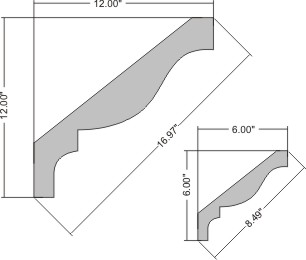Question
I just fitted a custom entry door - four flat panels, with custom moulding, solid core construction with laminated panels. We primed the exterior (Ben Moore penetrating oil-base), but a storm over the weekend showed rainwater coming in underneath every panel. The millwork Co. said we should have painted all the topcoats before exposing it to the weather, but it seems to me the panels aren't fitted properly, and now the panels have warped enough that no paint will "seal" it - who's right and what’s to be done?
Forum Responses
(Architectural Woodworking Forum)
From contributor D:
What are the specs you provided the supplier with? What specs did he supply you with? What is the supplier's warranty? What is the experience level of the supplier, and did they make it in their shop? What does 'solid core construction with laminated panels' mean? Does this mean solid wood type wood, or solid strandboard, LVL, MDF type wood? Are laminated panels of plywood or?
There are many more questions than answers until there is some more information. I do not think the additional topcoats would have made that much difference, especially long term, given the little bit I know about it. I also think it always a good idea to protect a door from weather until finish is 100% complete and cured.
As for the larger question, can exterior wood doors be reliable, I would say yes - if: If proper woods and methods are used, including designed to shed water, integral sticking or splined, double rabbeted bolection molds. Sealed panels held tightly by the sticking or molding and caulked if the panels are held in by molded frames.
If the door is hung properly and weatherstripped and has a proper sill. The finish must also help on the side of sealing, as does the periodic maintenance of the finish. Most small quantity door makers emulate BigDoorCo details and methods. I think if you are going to the expense of custom wood doors, then you should push the envelope some and take it further than BigDoorCo accountants would ever permit. Epoxy end seals, use superior joinery and woods and premium weatherstripping and finish, as well as proper hardware. Follow up maintenance.
None of this is cheap, nor should it be. Read the BigDoorCo warranties online, and then you see why those doors are cheap - the warranty almost never applies. While I have supplied many unwarranted situations, I have never had a customer back away - if they want wood, they will have wood. They may be finishing once a year, but they have wood.
One situation is south facing, no overhang, full sun and rain, and the door is recoated once or twice a year. 12 years, and while it looks older, it still functions perfectly. Wood exterior doors are certainly not for the masses, but it is not correct to rule them out in every exterior situation. Rain is not extreme treatment - it is normal. Accept it, design for it, and build for it.
Mediocrity exists, I have no doubt. However, I don't think that means we all need to roll over in unison and submit to the onslaught of plastic doors. Good design is always the better foundation and protection from mediocrity. Cheap has forced us to forego a simple porch roof, and has, by the dint of unintended consequences, forced the plastic door upon us. We now see the problem as that of wood doors instead of the fault of design (or lack of). I know I'm unable to change the world (especially aware with election at hand), but I still like to kick and fuss a bit. Maybe it will improve as a result, maybe not.
Plastic and steel are not a good choice either, but I'm a wood door guy at heart, plastic and steel would provide longer protection, but at a cost of both warmth and architectural diversity. Proper design, finish and maintenance are the keys to the solution here.
